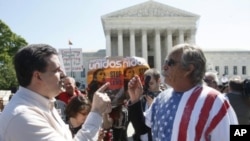The issue of illegal immigration took center stage Wednesday in Washington as the Supreme Court heard oral arguments for and against a controversial immigration law in the state of Arizona.
Whichever way the high court rules in the Arizona case is likely to have sweeping legal and political implications.
Outside the Supreme Court, demonstrators on both sides of Arizona’s illegal immigration law made their feelings known not only through song, but prayer.
“We ask Lord that you would touch us today and that you would touch those who are in this building deliberating, Lord,” prayed a woman.
Inside, the justices heard oral arguments both for and against the Arizona statute aimed at cracking down on the estimated 400,000 immigrants who have entered the state illegally.
One of the key provisions of the Arizona law requires police to check on the immigration status of people they stop or detain if they suspect that person is in the country illegally. Another part of the law makes it a state crime for illegals to hold a job or seek work.
Court demonstrations
Among those supporting the law outside the court was Ken Moreau, a police officer from Maryland.
“We have to have reasonable limits on immigration," said Moreau. "Our country has not only the right, but the responsibility to place reasonable limits on immigration, and so when we have 11- or 12-million people here illegally, that is a huge problem.”
Supporters of the Arizona law also argue the state was forced to take action to protect it borders because the federal government had failed to do so.
George Pope from Virginia also demonstrated in support of the law in front of the Supreme Court.
“At this particular time it is more of a states’-rights issue versus a federal issue, and an administration that is not really adhering to our border situation and immigration run amok,” he said.
The Obama administration sued Arizona and has blocked parts of the law in lower courts, arguing the responsibility for safeguarding national borders lies with the federal government, not the individual states.
But during oral arguments, several of the justices seemed to suggest they might uphold Arizona’s right to check the immigration status of those stopped by police.
Opponents of the law were also out in force in front of the high court, including Reverend Mari Castellanos, a minister with the United Church of Christ who emigrated to the United States from Cuba when she was a young girl.
“When I came to this country I was received with open arms and they showered opportunity upon me because the U.S. government hates the Cuban government," she said. "But I tell you what happened, my family thrived. We all went to college. We all have done very well and that is what happens when you welcome an immigrant. They can do very well.”
Opponents of the Arizona law also contend that requiring police to check on people’s immigration status will lead to racial profiling.
“The fact is that we have outlawed racial profiling. It is against the law," said Representative Luis Gutierrez, a Democrat from Illinois. "The question today is, will the Supreme Court uphold the right of American citizens to be able to travel without being stopped and restrained and questioned because of the color of their skin and the accent of their voice?”
Presidential politics
How to deal with illegal immigration has emerged as a political issue in the 2012 presidential campaign and is a major concern to Hispanic voters across the country, the fastest-growing population in the United States
Several other states have enacted laws similar to the one in Arizona and eagerly await a decision from the Supreme Court, which is expected by the end of June.





